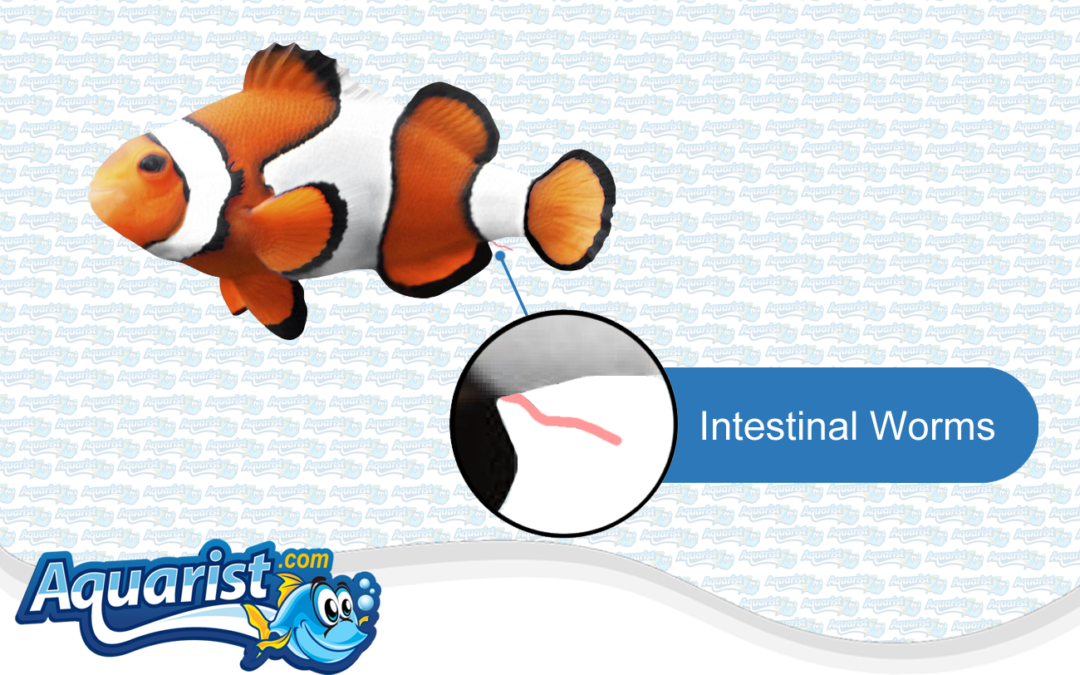Comprehensive Guide to Saltwater Fish Disease: Intestinal Worms
Intestinal worms are a common issue in saltwater fish and can lead to serious health problems if not treated promptly. These internal parasites affect the digestive system, causing symptoms such as weight loss, bloating, and poor appetite. Understanding how to recognize, treat, and prevent intestinal worm infections is crucial for maintaining a healthy saltwater aquarium. This guide provides a detailed overview of the types of intestinal worms, their symptoms, treatment options, and preventive measures.
What Are Intestinal Worms?
Intestinal worms are parasitic worms that infect the digestive system of fish, feeding on the nutrients from their host. Common types of intestinal worms found in saltwater fish include roundworms (nematodes), tapeworms (cestodes), and flukes (trematodes). These parasites can be introduced to an aquarium through contaminated food, new fish, or poor tank hygiene, leading to a range of health issues for the infected fish.
Types of Intestinal Worms in Saltwater Fish
Several types of intestinal worms can infect saltwater fish, each with its own set of characteristics:
- Roundworms (Nematodes): These are elongated, cylindrical worms that can infect the digestive tract of fish. They can cause blockages and damage the intestinal lining.
- Tapeworms (Cestodes): Tapeworms are flat, segmented worms that attach to the intestinal wall and absorb nutrients directly from the host’s digestive system.
- Flukes (Trematodes): Flukes are flat, leaf-shaped worms that can infect various parts of the digestive system and other organs. They often cause inflammation and irritation in the affected tissues.
Causes of Intestinal Worm Infections
Intestinal worm infections can be introduced into a saltwater aquarium through several pathways:
- Contaminated live or frozen food: Feeding fish with live or frozen foods that have not been properly cleaned or treated can introduce parasites.
- New fish or invertebrates: Adding new fish or invertebrates without proper quarantine can bring intestinal worms into the aquarium.
- Poor water quality: Stress from poor water quality can weaken fish, making them more susceptible to parasitic infections.
- Lack of proper tank maintenance: Failure to maintain clean tank conditions can increase the risk of parasite outbreaks.
Symptoms of Intestinal Worm Infections
Detecting intestinal worm infections in saltwater fish can be challenging, as symptoms may vary depending on the severity of the infection and the type of parasite. Common signs include:
- Weight loss: Despite eating regularly, infected fish may lose weight due to nutrient absorption by the worms.
- Bloating or swollen abdomen: The presence of worms can cause swelling or bloating in the fish’s abdomen.
- Stringy white feces: Fish infected with intestinal worms may excrete long, white, string-like feces.
- Poor appetite: Infected fish may eat less or refuse food altogether.
- Lethargy: Fish may become less active and spend more time resting at the bottom of the tank.
Treatment Options for Intestinal Worms
Proper treatment is essential to eliminate intestinal worms and restore the health of your saltwater fish. The following steps can help manage and treat these infections:
- Isolate infected fish: Quarantine infected fish to prevent the spread of parasites to other tank mates.
- Medicated foods: Use medicated foods that contain anti-parasitic ingredients such as praziquantel, levamisole, or fenbendazole to treat internal worms. Follow the medication instructions carefully.
- Bath treatments: Bath treatments using praziquantel or formalin can help kill worms. Prepare the treatment bath according to the product's instructions and monitor the fish closely during the process.
- Maintain water quality: Perform water changes and improve water quality to reduce stress and aid in recovery. Proper tank maintenance is crucial during treatment.
- Repeat treatments if necessary: Some medications may need to be repeated to ensure that all life stages of the parasites are eliminated.
Preventing Intestinal Worm Infections
Prevention is always better than treatment when it comes to intestinal worm infections. Here are some steps to help reduce the risk of parasite outbreaks:
- Quarantine new fish: Always quarantine new fish or invertebrates for at least 2-4 weeks before introducing them to the main tank.
- Feed high-quality, parasite-free foods: Ensure that live or frozen foods are from reputable sources and are properly cleaned or treated before feeding.
- Maintain excellent water quality: Regularly test and monitor water parameters, including ammonia, nitrite, and nitrate levels. Perform routine water changes to keep the tank clean.
- Disinfect equipment: Clean and disinfect equipment such as nets, buckets, and siphons that may come into contact with multiple tanks.
- Provide a balanced diet: Feed your fish a varied diet to boost their immune system and keep them healthy.
Pro Tips for Treating and Preventing Intestinal Worms
- Act quickly: Early detection and treatment are crucial to prevent the infection from spreading to other fish in the tank.
- Follow treatment instructions: Use medications as directed and complete the entire treatment regimen to ensure all parasites are eradicated.
- Monitor the fish closely: During treatment, observe the fish for any changes in behavior, appetite, or symptoms. If symptoms persist, consult an aquatic veterinarian.
- Consider a second round of treatment: Some parasites may require multiple treatments to eliminate all life stages.
Common Mistakes to Avoid When Treating Intestinal Worms
To increase the effectiveness of treatment and avoid further complications, be sure to avoid these common mistakes:
- Stopping treatment too early: Even if symptoms improve, continue the full course of treatment to ensure all parasites are eliminated.
- Overfeeding during treatment: Avoid overfeeding, as uneaten food can worsen water quality and stress the fish further.
- Not quarantining new arrivals: Skipping the quarantine process for new fish increases the risk of introducing parasites into the tank.
- Combining medications without guidance: Mixing different medications without consulting an expert can cause adverse reactions or reduce treatment efficacy.
Understanding the Impact of Intestinal Worms on Fish Health
Intestinal worms can significantly impact the health and well-being of saltwater fish. These parasites steal vital nutrients, leading to malnutrition, weight loss, and a weakened immune system. In severe cases, intestinal blockages or secondary infections can develop, leading to more serious health issues. Proper diagnosis, timely treatment, and preventive measures are essential for maintaining a healthy and thriving saltwater aquarium.
Conclusion
Intestinal worm infections are a common issue in saltwater fish that can lead to serious health problems if left untreated. By recognizing the symptoms, understanding the causes, and using effective treatment methods, you can successfully manage these infections and prevent future outbreaks. Always quarantine new arrivals, maintain good water quality, and provide a balanced diet to keep your fish healthy and free from parasites. With proper care and attention, your saltwater fish can thrive in a clean and healthy environment.

